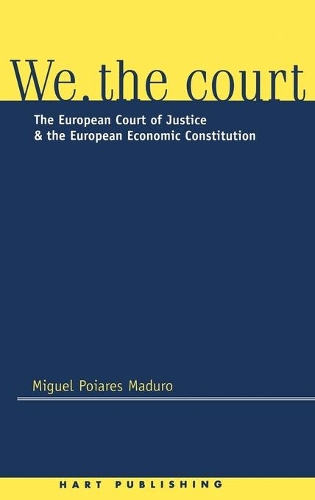
We the Court: The European Court of Justice and the European Economic Constitution
(Hardback)
Publishing Details
We the Court: The European Court of Justice and the European Economic Constitution
By (Author) Luis Miguel Poiares Pessoa Maduro
Bloomsbury Publishing PLC
Hart Publishing
1st February 1998
United Kingdom
Classifications
Tertiary Education
Non Fiction
Legal systems: courts and procedures
Methods, theory and philosophy of law
341.2622
Physical Properties
Hardback
208
Width 156mm, Height 234mm, Spine 16mm
Description
The need to balance power between the Member States and the Union, and between public power and the market has created powerful constitutional dilemmas for the European Union. Adopting an inter-disciplinary approach and drawing upon the jurisprudence developed around Article 30, this book offers both a descriptive and a normative analysis of the European Economic Constitution and discusses the role of the European Court of Justice in its development and in the review of State and Community legislation. The book is relevant to debates on the European Constitution and the reform of the regulatory State. The book proposes a different interpretation of the European Court of Justice case-law and discusses three models of the European Economic Constitution: decentralized, centralized and competitive. It also argues that the best source of legitimacy for European law lies in new forms of representation and participation helping to reform both the market and the State. The book stresses the role of European law as a tool to promote participation and representation of all European Union citizens in national political processes.
Reviews
The central free movement of goods provision has not only provoked more litigation than any other E.C. Treaty provision but also, with one or two exceptions, more sterile academic comment. Yet, it is only by grubbing around in the dirt that one finds gems, and Dr Poiares's book is a real diamond. Based upon his doctorate, it provides the most elaborately argued and most extensively researched thesis on Article 30; sweeping in its panorama; unique in its integration of perspectives of institutional efficacy and political economy into the normative debate, and intelligent in its execution. It will be a must read; for students and specialists alike for many years to come. -- Damian Chalmers * Law Quarterly Review *
the reviewed book represents an extremely interesting piece of work which may be regarded as pioneering, especially in the field of law concerned with the free movement rules within the European Union, but perhaps also more generally in the field concerned with the constitutional dimensions of this legal orderthe author, in a well written and engaging style, brings us behind the text of article 30 EC and the relevant case law to an understanding of the real and difficult issues involved. This book will be influential in this field of law and may therefore be highly recommended. -- Ulla B. Neergaard * Maastricht Journal of European and Comparative Law *
Author Bio
Miguel Maduro is an Advocate General at the European Court of Justice in Luxembourg.
